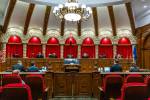Homeowner needs to take closer look at financial records
Q. My board does things without concern for either the covenants or NRS 116. One case in point is the board refuses to comply with NRS 116.3114, which pertains to surplus funds.
It states that under certain conditions that any surplus funds are to either be paid to the owners or credited to reducing their future assessments.
Our end of the fiscal year statement showed a surplus of at least $106,000. It was $150,000 if you count accounts receivable.
Additionally, the reserve fund is in surplus when compared with the reserve study.
An official complaint to the board resulted in this item being placed on the agenda but no action was taken. A follow-up question on the matter two months later resulted in the board stating that they were going to spend the money even though the funds were not allocated in the budget.
Any discussion or vote by the board on this subject must have been taken in executive session as it was not discussed at an open board meeting.
I believe NRS requires homeowners to file complaints with the ombudsman office before taking action in District Court, but can a homeowner sue directors individually in civil court without waiting months for the ombudsman to take action?
Would the association's insurance have to defend the directors even though it can be shown that the directors are deliberately violating the law?
A. First, NRS 116.3114 states that unless otherwise provided in the declaration (covenants, conditions and restrictions), any surplus funds of an association remaining after payment of or provisions for common expenses and prepayment of reserves must be paid to the unit owners or credited to them to reduce their future dues.
The first point is that this provision is subject to the reader's governing documents. The reader will have to review the covenants to see what is stated (if anything) pertaining to surplus funds and the directions given to the association as to the dispensation of the surplus funds. The covenants would take precedence over state law in this matter.
The financial information sent to me is a balance sheet. A balance sheet is a statement of the financial position of a person or a business at a particular time, in this case at the end of their fiscal year 2006.
Balance sheets consist of assets, liabilities and owner's equity. An asset is an economic resource expected to produce future benefits and a liability is a debt or obligation to pay by the association. Assets and liabilities can be short term or long term. Owner's equity is the net worth of either the individual or the business. It does not represent actual cash.
The balance sheet states the operating account has $80,313.06 as of Dec. 31, 2006. There is a contingency account balance of $26,064.93 and a petty cash fund of $400. The operating account is the one used for the deposit of homeowner dues and for the payment of expenses and the funding of the reserves. The contingency account is for potential expenses that are not accounted for in the operating budget or reserves.
It is to be used for emergencies -- paying normal operating expenses if there is an increase in nonpayment accounts; deductibles for unforeseen insurance claims; or purchases for capital items not already included in the reserve study, such as new cameras for security.
The association did prepay part of its insurance for 2007 in 2006 in the amount of $4,370.
On this balance sheet (which is not an income statement showing money received and money spent), there is a receivables owed to the association in the amount of $39,557.54.
This is not real money. It is money shown on the books that is owed to the association. It represents the delinquent money owed to the association from homeowners who have not paid their dues, late fees and fines.
The association did not write off this money. The accounts receivables of $39,557.54 may or may not be actually collected in the coming year.
In fact, if all of these owners default, most of the money would be written off. The reader cannot count the accounts receivables as surplus money.
The balance sheet also shows that there are owners who paid their 2007 dues in 2006 in the amount of $13,906.02. What this is telling us that the operating balance of $80,313.06 consists of $13,906.02 in 2007 dues.
The balance sheet shows that there was a negative income at the end of the year of $12,066.99. This would indicate that on a cash basis, the money deposited for operating the association, minus the operating expenses for the association, resulted in a negative balance. The association actually lost money.
The equity fund shows a total of $146,861.50. This is not real cash. It is the net worth of the association. It is the value of the association's assets minus its liabilities.
The bottom line for this reader's association is that going into 2007, the association had $39,557.54 in unpaid fees and dues, which may or not be collected. Of the operating account, $13,909.02 of the money is for 2007, so the ending cash balance in the operating account for 2006 is not the $80,313.06, but actually $66,404.04.
Finally, the net income for 2006 was actually a negative $12,066.99. The balance sheet that the reader sent to me would indicate that there is no surplus in 2006.
As to whether there is more money in the reserve account than is required, the reader did not send a copy of the projected reserve balance for 2006 or for 2007.
With a delinquency of $39,557.54 going into operating 2007, the association should be conservative because if this delinquency continues, the association could potentially not meet its reserve balance goal for 2008. In addition, note that in any given new year, the amount of money needed to be deposited into the reserve fund can be substantially higher than the previous year.
As to the legal questions, the ombudsman's office is the first line of jurisdiction as opposed to District Court. A homeowner can try to circumvent the process if a District Court judge agreed to hear it.
As to suing board members individually, motions would be made very quickly to remove their names as individuals to this legal dispute and, yes, the insurance company under its directors and officers' insurance policy would defend the board members.
Even if the homeowner suing the board believes that the board acted illegally, the association's insurance company has an obligation to defend.
It will be a decision of the courts as to whether the actions of the board were within their authority or were legal.
The insurance company has the right not to award damages. For example, punitive damages would not be awarded and the association would have to fund the punitive damages for which individual board members may be held liable to the association for repayment.
Barbara Holland, certified property manager, is president and owner of H&L Realty and Management Co. She is a member of the Institute of Real Estate Management. Questions may be sent to Association Q. & A., P.O. Box 7440, Las Vegas, NV 89125. Her fax number is 385-3759. Questions may be shortened and are subject to editing.















